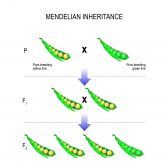Table of Contents
Insect Behavior Definition
An insect behavior refers to the various actions of an insect in response to a stimulus or to its environment. It covers a wide range of activities, such as feeding, locomotion, grooming, reproduction, learning, migration, and communication. (Ref. 1)
Some insect behaviors are driven by the effects of the pheromones. Insects release chemicals that affect the behavior of the other members of the same species as the latter perceive the released pheromones. When you see ants walking in a line and following one another they are really following a trail of pheromones that each one is leaving behind to show where to go. Most of these trails are by ants that are searching for food as they make their way back to the nest.
There are also insect behaviors that are influenced by environmental cues. Temperature, humidity, and toxins are some of the common environmental factors affecting insect behavior. Moths, for instance, show positive phototaxis, as they tend to fly towards the source of light.
Types of Insects Behavior
In general, there are two types of behavior observed in animals: (1) innate behavior and (2) learned behavior. The innate behavior is one that is inherent or instinctive. It is genetically wired to the organism. This is exemplified by the behaviors associated with the dorsal light reaction. As mentioned earlier, the moths tend to fly towards the source of light. The explanation for the moth’s behavior is still unclear. One possible reason is the instinctive tendency of the moth to keep the sun (light source) overhead or on its dorsal side. This is probably helping the moth to stay parallel to the ground. (Ref. 2)
Learned behavior is a type of behavior that the animal acquires through experience or learning. In insects, this learned behavior is exemplified by insects foraging for food. Honey bees, for instance, are able to learn from environmental signals to locate the food source. (Ref. 2)
See Also
References
- Hoy, M. A. (2019). Molecular Genetics of Insect Behavior. Insect Molecular Genetics, 413–461. https://doi.org/10.1016/b978-0-12-815230-0.00011-x
- CK-12 Foundation. (2015, December 11). Insect Behavior. CK-12 Foundation; CK-12 Foundation. https://www.ck12.org/biology/insect-behavior/lesson/Insect-Behavior-Advanced-BIO-ADV/
©BiologyOnline. Content provided and moderated by BiologyOnline Editors.







